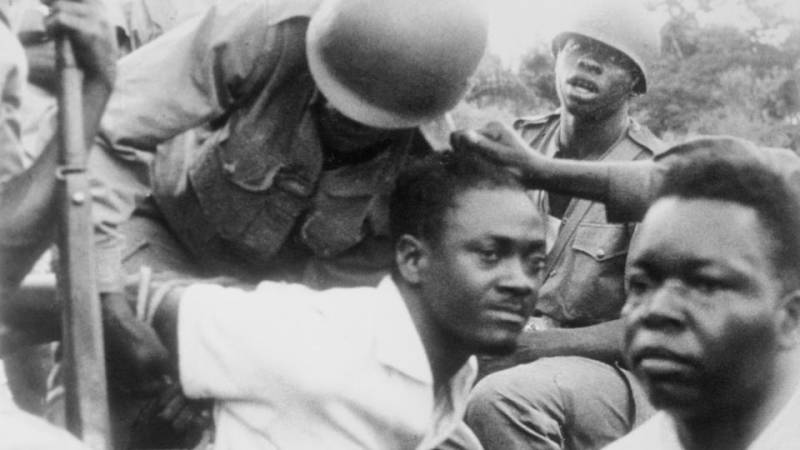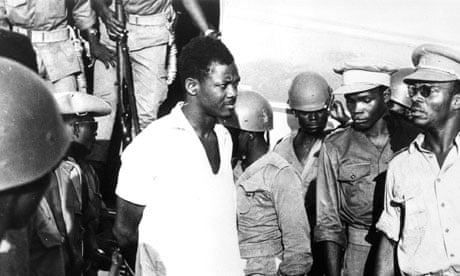
The 20th century history of Africa is drenched with the blood of revolutionaries who were assassinated by imperialist powers with the connivance of local functionaries. The great Congolese patriot Patrice Lumumba, who led Congo to independence from Belgian colonialism was one of the first African leaders to be assassinated, 60 years ago today. Needless to say, Congo especially, and Africa by extension, never recovered from Lumumba’s loss, as Congo descended into the kleptocracy of Mobutu Sese Seko's dictatorship supported by the West for the next three decades; even a protracted guerilla involving Che Guevara wasn’t able to dislodge Mobutu until Che’s Congolese ally, a guerilla leader Laurent Desire Kabila was able to make a triumphant return to Kinshasa in 1997. Despite a promising beginning, Kabila was too beholden to his other African allies, who had helped him come to power, as well as to power itself. He was eventually assassinated by his own bodyguards on January 16, 2001; but not before founding his own dynasty.
Yet had Lumumba been allowed to live, Congo could have become the lodestar of the African continent with its vast riches and great size similar in importance to Gamal Abdel Nasser’s Egypt. The brutal assassination of Lumumba in 1960 created quite a stir in South Asia. In Pakistan, beset by the dictatorship of Ayub Khan, and a left divided between its allegiances to Moscow and Peking, a student protest in solidarity with Lumumba in Lahore quickly became a rallying cry against the Pakistani dictatorship. This protest propelled a young Tariq Ali into the front ranks of the anti-Ayub student movement and later among the leading 1960s radicals in Europe.
Next door in India, the murder of Lumumba led its Prime Minister Jawaharlal Nehru to remark, ‘A dead Lumumba is many times more powerful than a living Lumumba.’ This remark piqued the 39 year old revolutionary poet Sahir Ludhianvi – who will be celebrating his birth centenary on March 8 this year – to pen his famous dirge Khoon Phir Khoon Hai (Blood Is But Blood) with the opening lines:
Zulm phir zulm hai badhta hai to mit jaata hai
Khoon phir ḳhoon hai tapkega to jam jaega
 Sahir’s poem is presented here in English translation following the original Urdu text below both as a means to remembering the glorious memory and legacy of Lumumba’s brutal murder on its 60th anniversary and also as a tribute to Sahir in his birth centenary year:
Sahir’s poem is presented here in English translation following the original Urdu text below both as a means to remembering the glorious memory and legacy of Lumumba’s brutal murder on its 60th anniversary and also as a tribute to Sahir in his birth centenary year:
Zulm phir zulm hai badhta hai to mit jaata hai
Khoon phir ḳhoon hai tapkega to jam jaega
Khaak-e-sahra pe jame ya kaf-e-qatil pe jame
Farq-e-insaaf pe ya paa-e-salaasil pe jame
Tegh-e-be-daad pe ya laasha-e-bismil pe jame
Khoon phir ḳhoon hai tapkega to jam jaega
Laakh baithe koi chhup-chhup ke kameen-gaahon mein
Khoon ḳhud deta hai jalladon ke maskan ka suraagh
Sazishen laakh odhaati rahen zulmat ki naqaab
Le ke har boond nikalti hai hatheli pe charaagh
Zulm ki qismat-e-naakaara-o-rusva se kaho
Jabr ki hikmat-e-parkaar ke iima se kaho
Mahmil-e-majlis-e-aqvaam ki laila se kaho
Khoon deevaana hai daaman pe lapak sakta hai
Shola-e-tund hai ḳhirman pe lapak sakta hai
Tum ne jis ḳhoon ko maqtal mein dabaana chaaha
Aaj vo koocha-o-bazar mein aa nikla hai
Kaheen shola kaheen naara kaheen patthar ban kar
Khuun chalta hai to rukta nahin sangeenon se
Sar uthaata hai to dabta nahin aainon se
Zulm ki baat hi kya zulm ki auqaat hi kya
Zulm bas zulm hai aaghaaz se anjaam talak
Khoon phir ḳhoon hai sau shakal badal sakta hai
Aisi shaklen ke mitao to mitae na bane
Aaise shole ke bujhao to bujhae na bane
Aaise naare kei dabao to dabae na bane.
(Oppression is but oppression, it increases and sometimes it does not
Blood is but blood, it will drip, then it will clot.
It clots upon the dust of the desert, or the hand of the assassin
Upon the head of justice or the chained feet
On the sword of tyranny or the slaughtered corpse
Blood is still blood, it will drip, then it will clot.
However much someone hides in the lairs
Blood itself tracks the abode of the executioners
However much conspiracies cover the veil of darkness
Every drop sets out with a lamp on the palm in earnestness.
Say to the futile and humiliating fortune of oppression
Say to the prodding of the wisdom of the compass of coercion
Say to the mistress of the seat of the assembly of nations
Blood is crazy, it can seize the hem
It is a violent flame, it can spring upon the harvest.
The blood which in the slaughterhouse, you sought to quell
Today has come out in the street and bazaar to tell
Becoming a flame here, a cry there, a stone somewhere
Running blood cannot be stopped with bayonets
It cannot be pressed with mirrors upon raising its head.
Oppression is insignificant, it has no position
Oppression is but oppression from beginning to its conclusion
Blood is still blood, it can change many a form
Such forms that even to erase it, it will not conform
Such flames that it is impossible to extinguish
Such slogans that it is impossible to relinquish)
Yet had Lumumba been allowed to live, Congo could have become the lodestar of the African continent with its vast riches and great size similar in importance to Gamal Abdel Nasser’s Egypt. The brutal assassination of Lumumba in 1960 created quite a stir in South Asia. In Pakistan, beset by the dictatorship of Ayub Khan, and a left divided between its allegiances to Moscow and Peking, a student protest in solidarity with Lumumba in Lahore quickly became a rallying cry against the Pakistani dictatorship. This protest propelled a young Tariq Ali into the front ranks of the anti-Ayub student movement and later among the leading 1960s radicals in Europe.
Next door in India, the murder of Lumumba led its Prime Minister Jawaharlal Nehru to remark, ‘A dead Lumumba is many times more powerful than a living Lumumba.’ This remark piqued the 39 year old revolutionary poet Sahir Ludhianvi – who will be celebrating his birth centenary on March 8 this year – to pen his famous dirge Khoon Phir Khoon Hai (Blood Is But Blood) with the opening lines:
Zulm phir zulm hai badhta hai to mit jaata hai
Khoon phir ḳhoon hai tapkega to jam jaega
 Sahir’s poem is presented here in English translation following the original Urdu text below both as a means to remembering the glorious memory and legacy of Lumumba’s brutal murder on its 60th anniversary and also as a tribute to Sahir in his birth centenary year:
Sahir’s poem is presented here in English translation following the original Urdu text below both as a means to remembering the glorious memory and legacy of Lumumba’s brutal murder on its 60th anniversary and also as a tribute to Sahir in his birth centenary year:Zulm phir zulm hai badhta hai to mit jaata hai
Khoon phir ḳhoon hai tapkega to jam jaega
Khaak-e-sahra pe jame ya kaf-e-qatil pe jame
Farq-e-insaaf pe ya paa-e-salaasil pe jame
Tegh-e-be-daad pe ya laasha-e-bismil pe jame
Khoon phir ḳhoon hai tapkega to jam jaega
Laakh baithe koi chhup-chhup ke kameen-gaahon mein
Khoon ḳhud deta hai jalladon ke maskan ka suraagh
Sazishen laakh odhaati rahen zulmat ki naqaab
Le ke har boond nikalti hai hatheli pe charaagh
Zulm ki qismat-e-naakaara-o-rusva se kaho
Jabr ki hikmat-e-parkaar ke iima se kaho
Mahmil-e-majlis-e-aqvaam ki laila se kaho
Khoon deevaana hai daaman pe lapak sakta hai
Shola-e-tund hai ḳhirman pe lapak sakta hai
Tum ne jis ḳhoon ko maqtal mein dabaana chaaha
Aaj vo koocha-o-bazar mein aa nikla hai
Kaheen shola kaheen naara kaheen patthar ban kar
Khuun chalta hai to rukta nahin sangeenon se
Sar uthaata hai to dabta nahin aainon se
Zulm ki baat hi kya zulm ki auqaat hi kya
Zulm bas zulm hai aaghaaz se anjaam talak
Khoon phir ḳhoon hai sau shakal badal sakta hai
Aisi shaklen ke mitao to mitae na bane
Aaise shole ke bujhao to bujhae na bane
Aaise naare kei dabao to dabae na bane.
(Oppression is but oppression, it increases and sometimes it does not
Blood is but blood, it will drip, then it will clot.
It clots upon the dust of the desert, or the hand of the assassin
Upon the head of justice or the chained feet
On the sword of tyranny or the slaughtered corpse
Blood is still blood, it will drip, then it will clot.
However much someone hides in the lairs
Blood itself tracks the abode of the executioners
However much conspiracies cover the veil of darkness
Every drop sets out with a lamp on the palm in earnestness.
Say to the futile and humiliating fortune of oppression
Say to the prodding of the wisdom of the compass of coercion
Say to the mistress of the seat of the assembly of nations
Blood is crazy, it can seize the hem
It is a violent flame, it can spring upon the harvest.
The blood which in the slaughterhouse, you sought to quell
Today has come out in the street and bazaar to tell
Becoming a flame here, a cry there, a stone somewhere
Running blood cannot be stopped with bayonets
It cannot be pressed with mirrors upon raising its head.
Oppression is insignificant, it has no position
Oppression is but oppression from beginning to its conclusion
Blood is still blood, it can change many a form
Such forms that even to erase it, it will not conform
Such flames that it is impossible to extinguish
Such slogans that it is impossible to relinquish)
